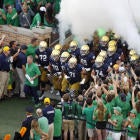The Power Five commissioner was ready for the question: How about Notre Dame in the playoff?
"I would refer you to the protocol," the commish countered.
Well played, Mr. Commissioner. In that moment, you knew exactly what he was referring to. The College Football Playoff protocol adopted six years ago grandly states that "when circumstances at the margins indicate that teams are comparable …" one way to separate them is by: *championships won.
You don't have to be hit over the head with a shillelagh to know Notre Dame, as an independent, doesn't qualify for that bullet point.
Two words in a nine-page document are significant lately not only because the Irish are a playoff factor but also because any mention of such produces its own share of bullet points regarding the Irish.
*Jealousy.
*Acrimony.
*Indignation.
If you want expansion of the four-team bracket, you want to root for the Irish being a playoff factor. Notre Dame stands alone. Its independence is a daily reminder. Its legends are woven through time. It might have more statues of former coaches anywhere outside of Alabama.
It stands for something bigger than the pursuit of the end zone.
That independence also has some unintended consequences. So when the Irish -- 6-0 for the first time since 2012 – became a playoff factor, those old emotions began to be dredged up.
If it did make the playoff, Notre Dame would be snatching a Power Five spot. That means at least two Power Five conferences would not be represented for the second straight year. Last season, both Alabama and Georgia made it from the SEC.
"I have enormous confidence in the selection committee and the process," Notre Dame athletic director Jack Swarbrick told CBS Sports. "What the prior years have demonstrated is they're focused on the cardinal rule: Identify the four best teams."
But there are different routes to get to that Football Four. While the Power Five conferences beat each other up with round-robin (Big 12) and nine-game unbalanced league schedules (Pac-12, Big Ten, Big 12), all of them put it on the line in conference championship games.
As an independent, Notre Dame more or less arranges its schedule. This year, it looks good enough to win all the games on that schedule.
Bottom line perception for those haters: Notre Dame has a different (read: easier) road to the playoff than those other contenders.
"We'd be happy to play a 13th game," Swarbrick said. "There's only one [other] school that's told they can't play a 13th game. We would love to do it."
Swarbrick is referring to BYU, one of only two other independents (Army is the other) to win a national championship.
The last titles for each were decades ago. Neither program is a part of college athletics' power elite like Notre Dame. There would be no CFP without Notre Dame. It would be an illegitimate championship without the Irish, their eight national championships and massive ratings potential.
If you haven't grasped it, Swarbrick was being facetious about that 13th game. There are iron bolts holding aircraft carriers together weaker than ND's commitment to independence. Because of all that, it will be fascinating to see how Notre Dame is regarded when the first set of CFP Rankings is released on Oct. 30. Swarbrick was one of the college administrators (along with the commissioners) who helped put together the playoff.
"When we were developing this model and we were looking back over 25 years, I think there were only two years you had [more than] five teams in the mix [at the end of the season]," Swarbrick said.
That's exactly where the Irish are at the moment, ranked No. 5 in AP Top 25. That's also a reminder of the possible pending Armageddon.
Consider a 12-0 Notre Dame in playoff contention with …
- 12-1 Alabama -- ranked No. 1 all season -- coming off a close upset loss to Georgia in the SEC Championship Game
- 12-1 Texas, which could have beaten five ranked teams (Oklahoma twice) to win the Big 12
- Undefeated Ohio State coming off a Big Ten title
- Undefeated Clemson after winning fourth straight ACC title
In Notre Dame's favor: Alabama made it in last year playing only 12 games and not so much as winning its division. The difference being the Tide began the season at least competing for a championship in the SEC.
Working against it: With only 12 games, the Irish almost have to go undefeated without that 13th data point. That's what happened in 2012 in the old BCS when it was the only undefeated team eligible for the postseason. (Ohio State finished 12-0 but was serving a postseason ban.)
In limbo: There are 11 undefeated teams that could remain as such by the time Week 7 is over and the season has reached its halfway point. The possibility exists of seven of those teams playing another undefeated team this season. ND is not one of those seven.
The lingering question that remains is whether the Irish should be in.
The CFP Selection Committee isn't supposed to have a selective memory, but Notre Dame was non-competitive in its last national title appearance, a 42-14 to Alabama in the 2013 BCS Championship Game.
"Notre Dame controls its schedule more than anyone else," said Jerry Palm, CBS Sports' playoff and bowls expert. "They play fewer road games than anyone else."
In addition to a rotating five-game scheduling agreement with the ACC, Notre Dame also has three annual rivalry games (USC, Stanford, Navy). That leaves four other games that this season: Michigan, Ball State, Vanderbilt and Northwestern. It plays only four true road games at Wake Forest, Virginia Tech, Northwestern and USC. Worth noting: That's as many true road games as played by No. 1 Alabama.
"Those five ACC games are identified by the conference," Swarbrick said. "Three annual games we're committed to. We have an eight-game schedule that is effectively locked in."
The second bullet point in that protocol is strength of schedule. As it stands, the Irish do not have another team currently ranked on their schedule. (They have already beaten No. 14 Michigan, No. 7 Stanford and No. 24 Virginia Tech.)
The winning percentage of Notre Dame's remaining opposition (.515) is the lowest among the contenders listed above. It has the third-toughest cumulative schedule strength (.597) among those same teams, according to the NCAA.
Asked if he'll be watching Dec. 1 -- the day of those conference title games -- Swarbrick did not believe he would be.
"Probably not," he said. "We may have hockey or basketball games. It is what it is. I'm not wasting any psychological energy on it."






















